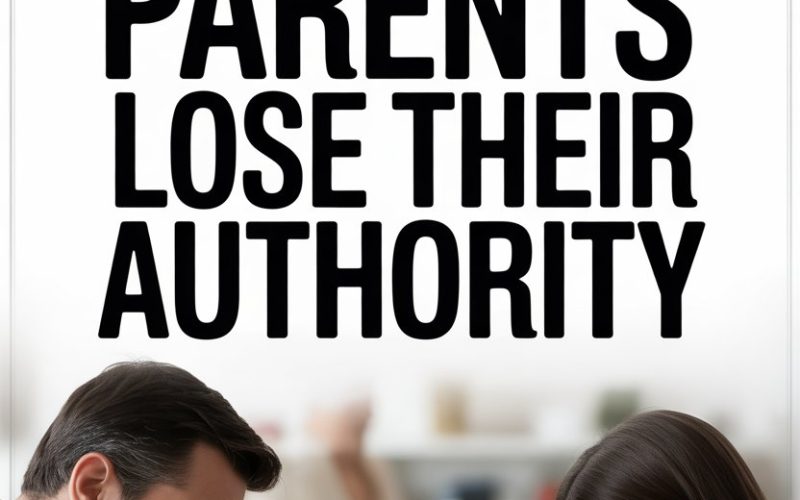Parenting comes with a lot of noise—some of it actual, like the wild shrieks of children hopped up on sugar, and some of it metaphorical, like the endless advice coming from every direction: family, friends, and that bloke on Instagram with suspiciously clean toddlers.
But the real danger is what slips by quietly.
Seemingly innocent moments that, over time, chip away at your authority until you find yourself negotiating with a six-year-old terrorist at bedtime, promising a lifetime supply of biscuits if they’ll just put on their pyjamas.
Right under our noses, authority is lost not with a bang but with a whimper. Here’s what’s happening—and how you can reclaim your crown.
Tiny Negotiations That Stack Up
Ever said, “Okay, five more minutes,” only to find yourself still on the playground half an hour later, making deals like a rookie at a car boot sale?
Kids are master negotiators because they sense an opportunity in every hesitation.
It seems harmless—what’s a few extra minutes?—but over time, these tiny negotiations set the tone: your rules are flexible. Kids learn, “If I push, I get what I want.”
Before you know it, the bedtime you set is just a suggestion, and that no-sweets-before-dinner rule? A laughable myth.
Start reasserting yourself with small, consistent no’s. You don’t have to transform into a Victorian headmistress overnight, but when you say it’s time to leave, mean it.
Direct, calm, and unwavering—like a bouncer at a pub closing time.
Mixed Messages and Magical Thinking
Picture this: You lay down a rule about screens, but then…you’re knackered, the laundry has staged a coup in the hallway, and suddenly the iPad is your co-parent.
Or maybe you threaten consequences—“No dessert if you don’t eat your veggies!”—but then serve up pudding anyway when the tears begin.
Kids aren’t daft. They spot these inconsistencies faster than they spot a hidden packet of crisps in your handbag. (Child psychologist Dr. Laura Markham explains how consistency is crucial for authority.)
To hold onto your authority, decide on your boundaries when you’re calm and stick to them even when you’re not. If you genuinely can’t enforce a consequence, don’t threaten it.
You’re not trying to win an Oscar for Most Dramatic Ultimatum.
Apologising for Parenting
Guilt might as well be a mandatory accessory for parents. Sometimes, we apologise for parenting—“Sorry, but you have to turn off the TV now,” or “Sorry, you can’t have ice cream before dinner.”
Apologies have their place (like when you accidentally donate your child’s favourite cuddly toy to the school fête), but using them when you’re simply enforcing a reasonable boundary tells your little ones you’re not quite comfortable in your own authority.
Swap those sorrys for confidence. “It’s bedtime now,” works much better than, “Sorry, but it’s bedtime.” You’re not being mean; you’re being the grown-up.
Letting Technology Parent for Us
Tablets and TV shows save our bacon. No judgement—sometimes you need a moment to drink your tea while it’s still hot. The trouble shows up when screens become the only way to calm, distract, or entertain your child.
Handing over your phone at the first sign of a tantrum teaches kids that someone (or something) else is in charge of their regulation.
Taking back your authority means showing your child that you’re capable of handling big emotions—even the truly epic supermarket meltdowns. (Research from Common Sense Media highlights the power of modelling emotional regulation.)
Try swapping screen time with a bit of one-on-one attention, storytelling, or even letting your child be bored. That’s where creativity—and sometimes a weird glitter mess—happens.
The “Because I Said So” Trap
Parents sometimes default to “because I said so” out of sheer exhaustion. While it has its place (you’re not obliged to deliver a TED Talk on bedtime hygiene nightly), relying on it too much can backfire.
Kids aren’t robots; they need to understand the ‘why’ behind rules to internalise them.
When possible, give a reason. “We wash hands before dinner so we don’t get sick,” or, “We brush teeth so they don’t fall out and leave you looking like a pirate.”
Bonus points for delivering the message with a bit of humour or a silly voice. (Experts at Harvard Graduate School of Education emphasise the value of explaining boundaries.)
You get to be the boss, but an approachable boss is always more effective than a dictator.
Parental United Fronts That Fracture
Children have a sixth sense for detecting a split between parents: one says no, one says yes, and suddenly you’re reenacting courtroom dramas over pizza toppings.
These cracks can leave kids confused about whose authority counts.
A quick chat behind closed doors (or at least out of little ears’ range) helps parents stay aligned. When disagreements pop up, agree to discuss them privately, then present a united decision.
Your child will feel more secure—and less likely to try out their legal skills. (Parenting educator Adele Faber offers great scripts for united parenting.)
Trying to Be the Fun Parent All the Time
In the quest to never be “the mean one,” some parents hand over authority on a silver platter.
Unlimited treats, late nights, saying yes to every request in the hopes of being liked—these things feel good in the moment but slowly erode your position as the leader.
You don’t have to be Mary Poppins every day. Kids thrive when they know there are boundaries—even if they loudly disagree at the time.
Balance light-heartedness with clear limits, and watch your home become less of a circus.
Overexplaining, Negotiating, and Reasoning to Exhaustion
Ever find yourself offering a full PowerPoint presentation on why broccoli is good for you? Kids will listen—sort of—but often, they’re stalling for time or wearing you down.
There’s a place for conversation, but overexplaining every rule invites debate, which leads straight to the land of “but why?” until you’re both too tired to care.
State your expectations simply and avoid falling into negotiation spirals. A short, calm explanation is plenty.
Anything past that, and you’re just providing ammunition for the next round of debate club.
Ignoring Your Own Boundaries
Children are always watching. If you say “no phones at dinner” but sneak a look at your emails under the table, the message is clear: the rules don’t really matter.
They’ll learn quickly which boundaries are real and which are up for grabs.
Model the respect you’d like to see. If you value politeness, be polite.
If you want them off screens during meals, put yours down too. (A University of Michigan study shows parental modelling shapes children’s behaviour long-term.)
This doesn’t mean you have to be perfect (unless you enjoy hiding in the bathroom to eat chocolate). Just stay honest—and laugh at your own slip-ups.
Handing Over Decisions Too Soon
Letting kids choose between two jumpers is empowering; asking them to decide the family’s summer holiday destination is, perhaps, optimistic. Children crave autonomy, but they also need guidance.
Too much choice, too soon, can leave them anxious—and erode your authority as a steady guide.
Pick areas where your child can control small things, but keep the big decisions in grown-up hands. Structure gives them the confidence to make age-appropriate choices—without running the show.
Reclaiming Your Authority Tonight
There’s no need for a total overhaul or a week-long parenting retreat in the woods (unless you like digging your own toilet). Shifts in authority happen quietly, and so does reclaiming it.
Try one small change, stick to it, and watch as your confidence—and your child’s respect—grow.
Maybe it’s a simple, “No more snacks after dinner,” delivered with a smile and no apology. Or refusing to negotiate bedtime, even in the face of crocodile tears.
Adjust as you go, forgive yourself when you slip, and know that authority isn’t about being a tyrant.
It’s about loving leadership—the kind that sends your kids into the world knowing they’re safe, respected, and, yes, sometimes required to eat their broccoli.
The silent way parents lose their authority can be reversed, and it’s usually with quieter, steadier steps than you think.
A little consistency, confidence, and a willingness to laugh at the madness will take you further than any parenting book ever could.
Now, about that cup of tea—better drink it before someone asks for another snack.




